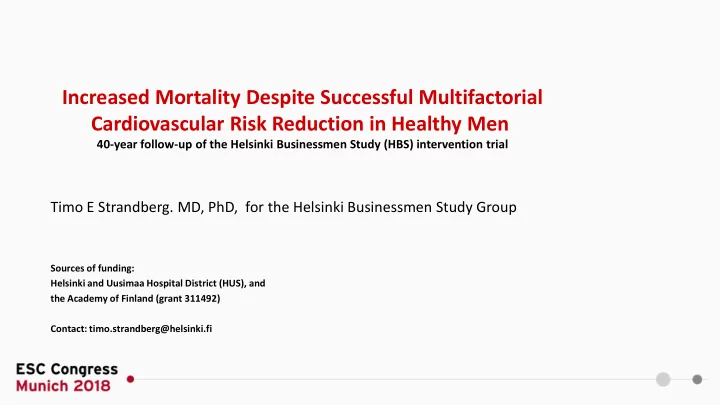

Increased Mortality Despite Successful Multifactorial Cardiovascular Risk Reduction in Healthy Men 40-year follow-up of the Helsinki Businessmen Study (HBS) intervention trial Timo E Strandberg. MD, PhD, for the Helsinki Businessmen Study Group Sources of funding: Helsinki and Uusimaa Hospital District (HUS), and the Academy of Finland (grant 311492) Contact: timo.strandberg@helsinki.fi
Conclusions • Contrary to expectations, multifactorial prevention trial using lifestyle modification and drugs in healthy men resulted in increased mortality in the treated intervention group during long-term • Reason has been an enigma, and previous analyses have not detected explanations, for example drug treatments used in intervention were not involved • With the present analyses we speculate that stress induced by personal intervention with relatively weak effect on risk factors (statins and modern antihypertensives were not available at that time) would have been harmful for vulnerable individuals -- characterized by shorter vacation time
Background • A randomized and controlled multifactorial prevention trial (HBS) performed during the 1970s aimed to prevent cardiovascular disease in healthy middle-aged men by reducing well-known risk factors for 5 years. • Contrary to expectations, 15-year follow-up revealed increased mortality in the intervention group as compared to high-risk controls (JAMA 1991; Sep 4;266:1225-9) • Reason has been an enigma, because totality of evidence indicates that the procedures should have been beneficial, and lower cardiovascular risk is associated with lower mortality in the background HBS cohort.
Background • A randomized and controlled multifactorial prevention trial (HBS) performed during the 1970s aimed to prevent cardiovascular disease in healthy middle-aged men by reducing well-known risk factors for 5 years • Contrary to expectations, 15-year follow-up revealed increased mortality in the intervention group as compared to high-risk controls (JAMA 1991; Sep 4;266:1225-9) • Reason has been an enigma, because totality of evidence indicates that the procedures should have been beneficial, and lower cardiovascular risk is associated with lower mortality in the background HBS cohort
Purpose and key points about methods • Habits of working, sleeping, and vacationing have been associated with health and mortality in various studies, including the large American multifactorial prevention study MRFIT • The present analyses related previously unanalyzed baseline factors (work, sleep, vacation time) to follow-up mortality • Mortality and causes of death were retrieved from national registers, and original control and intervention groups were compared
Results • We found a significant interaction between shorter vacation, intervention and mortality • Men with shorter vacation - less than 3 weeks annually - had higher mortality in the intervention – but not in the control group
Key messages • Our results hardly question multifactorial prevention as such, but may warrant a continuous reassessment of methods used in the primary prevention of cardiovascular diseases • Drugs have clearly improved from the 1970s, but have the methods of lifestyle modification? • Aggressive lifestyle modifications may increase stress and be unhealthy for vulnerable individuals • Lifestyle advice should be individualized and wisely combined with modern drug treatment to reduce risk and prevent cardiovascular events in high-risk individuals
Literature • Gump BB, Matthews KA. Are vacations good for your health? The 9-year mortality experience after the Multiple Risk Factor Intervention Trial. Psychosom Med 2000;62:608-12. • Strandberg TE, et al. Associations of vacation time with lifestyle, long-term mortality and health-related quality of life in old age: The Helsinki Businessmen Study . Eur Geriatr Med 2017;8:260-264 • von Bonsdorff MB et al. Working hours and sleep duration in midlife as determinants of health-related quality of life among older businessmen. Age Ageing 2017;46:108-112. • Strandberg TE et al. Increased Mortality Despite Successful Multifactorial Cardiovascular Risk Reduction in Healthy Men. J Nutr Health & Aging 2018, ePub
Thank you
Recommend
More recommend